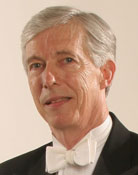 Loren Kitt, principal clarinet of the National Symphony Orchestra, delivered a fine performance of Mozart's Clarinet Quintet in A, K. 581 at the mid-point concert of the American Chamber Players' June Festival at the Kreeger Museum (see Charles's review of the first concert last week). Accompanied by Lisa Shihoten and Lauren Weibel, violins, Miles Hoffman, viola, Jean-Louis Haguenauer, piano, and Alberto Parrini, cello, Mr. Kitt made the music flow like wine, as it should; fine phrasing from Kitt & Co. and a nice bounce in the Allegretto that concludes the work. Balances were good in this work, though the violins seemed a bit louder than the rest, and the lower strings -- particularly the cello playing of Mr. Parrini, who seemed the most sensitive and alert player among the strings -- didn't come through so clearly. A few bobbles from Mr. Haguenauer did no great harm.
Loren Kitt, principal clarinet of the National Symphony Orchestra, delivered a fine performance of Mozart's Clarinet Quintet in A, K. 581 at the mid-point concert of the American Chamber Players' June Festival at the Kreeger Museum (see Charles's review of the first concert last week). Accompanied by Lisa Shihoten and Lauren Weibel, violins, Miles Hoffman, viola, Jean-Louis Haguenauer, piano, and Alberto Parrini, cello, Mr. Kitt made the music flow like wine, as it should; fine phrasing from Kitt & Co. and a nice bounce in the Allegretto that concludes the work. Balances were good in this work, though the violins seemed a bit louder than the rest, and the lower strings -- particularly the cello playing of Mr. Parrini, who seemed the most sensitive and alert player among the strings -- didn't come through so clearly. A few bobbles from Mr. Haguenauer did no great harm.Balances throughout the program seemed a bit odd, the ensemble sounding consistently loud with the exceptions noted. This may be an artifact of the Kreeger Great Hall, with lots of hard reflective surfaces (concrete mainly), but one would think this group, regulars at the Kreeger, would have adjusted by now. That reservation aside the other performances were fine, but not as good as the Mozart, which I dare say got the bulk of the rehearsal time (it was worth it). Beethoven's B-flat Clarinet Trio, op. 11, bounced along nicely but only caught fire in the concluding (and whistle-able) Tema con variazioni. Light music by Milhaud (Suite for clarinet, violin, and piano, adapted from a film score) and very light music by Martinů (Serenata II for two violins and viola) filled out the program, played well but a bit more loud than piquant. A fine program for a midsummer's night, with a glance at great art thrown in: who could complain? It could have been better, though.
P.S. Mr. Hoffman, author of a well-known guide to classical music, spoke NPR-style about the music in lieu of program notes. In linking Martinů to Les Six (fair enough) he suggested "that was later, though." Martinů's Serenata dates from 1932, and Les Six became official no later than 1920, so...no, not later at all (Mr. Weibel, who is French, shrugged when asked for confirmation of the chronology). A small point? Yes, but Mr. Hoffman is a self-styled classical music guru, and as such should be a bit more informed about the music he is playing.
No comments:
Post a Comment